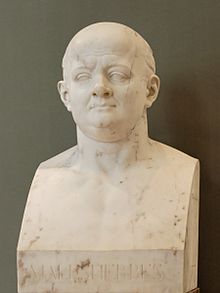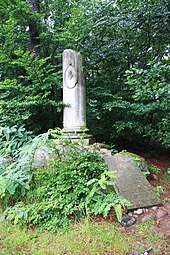Chrétien-Guillaume de Lamoignon de Malesherbes
Chrétien-Guillaume de Lamoignon de Malesherbes (born December 6, 1721 in Paris , † April 23, 1794 ibid) was a French statesman , minister and later defender of Louis XVI.
Live and act
He was born into a family of lawyers, his father was Guillaume de Lamoignon de Malesherbes (1683–1772), President of the Parlement Président à mortier au Parlement de Paris from 1723 to 1736. His mother was Anne Elisabeth Roujault (1692– 1734) and the couple had two other children, Barbe Nicole de Lamoignon de Malesherbes († 1794) and Marie Elisabeth de Lamoignon de Malesherbes (* 1715). It was their second marriage, they both married in 1715. His first marriage to Madeleine Louise d´Aligre (1697–1714), they married in 1711, remained childless.
Chrétien-Guillaume studied law. After a short time as a lawyer , he was appointed President des cour des aides of the Paris Parliament in 1750 , after his father, Guillaume de Lamoignon de Blancmesnil, had been promoted to Chancelier de France . The duties of a chancellor were to control the press, and this duty was entrusted to Malesherbes by his father during his eighteen years in office and brought him into contact with the public much more than his judicial duties.
In 1741 he was appointed Deputy Attorney General of the Paris Parliament, procureur général du parlement de Paris . He then served as an advisor to the conseiller in 1744 and was then the first president of the Cour des Aides , cour des aides de Paris . He married Françoise Thérèse Grimod de la Reynière (1732–1771) in 1749. They had two daughters, Marguerite Thérèse de Lamoignon de Malesherbes (1756–1794) and Françoise Pauline de Lamoignon de Malesherbes (1758–1827).
In order to carry out his duties efficiently, he kept in touch with the literary leaders in Paris - especially with Denis Diderot , Friedrich Melchior Grimm - one even goes so far as to say that the Encyclopédie ou Dictionnaire raisonné des sciences, des arts et des métiers without Malesherbes 'Help would probably never have been published, since Malesherbes, as chief censor, Censure royale had granted the Encyclopédie royal privilege in 1751 . Malesherbes should not have granted this privilege, since he could have let the work pass in silence.
In 1771 he was asked to get involved in politics; the parliaments in France had been dissolved and a new procedure for the administration of justice had been drafted by Maupeou . It was praiseworthy in itself as it aimed at better and faster administration of justice, but it was detrimental as it tended to be over-centralized and abolished the hereditary nobility which - despite all its shortcomings - was inherently independent and controlled who wielded the power of the king. Malesherbes submitted a vigorous remonstrance against the new system and was immediately banished to his country residence in Malesherbes Castle. After the accession of Louis XVI. However, he was recalled together with the old parliament and made Minister of the maison du roi in 1775 .
He only held this post for nine months, during which time, however, he turned his attention to the Kingdom Police, which was added to his area, and did much to curb the hated practice of issuing lettres de cachet . The protest des cour des aides of 1775 is one of the most important documents of the old regime in France. It took stock of the corrupt and inefficient administration and confronted the king with utterly blunt criticism.
After his retirement from the cabinet with Turgot in 1776, Malesherbes went completely into a contented country and domestic life and traveled through Switzerland, Germany and the Netherlands. An essay on Protestant marriages (1787) contributed greatly to their national recognition in France.
Malesherbes was a passionate botanist. At the age of 24 he studied botany with Bernard de Jussieu . Its avenue at the Château de Malesherbes was exceptionally planted; he had written on behalf of the botanists against Buffon , who had attacked them, and had been elected a member of the Académie des Sciences in 1750 . Malesherbes was accepted into the Académie française and dealt with scientific and literary subjects further and more intensively in his retirement home. The king, increasingly in political trouble, wanted his support and in 1787 appointed him back to the cabinet, Conseil du roi de France . Malesherbes only retained his office for a short time - from 1787 to 1788 - and returned to his country estate when the problems were unsolvable.

In 1792 he left his asylum, to which he had retired for reasons of age. Together with François Tronchet and Raymond de Sèze , he took over the defense of the king before the convention , convention nationale, and finally brought news of his conviction to the king. After this company he returned to the country again, but in December 1793 he was arrested with his daughter Antoinette de Lamoignon de Malesherbes, his son-in-law Louis Le Peletier de Rosambô (1747-1794) and his grandchildren. He was guillotined on Wednesday, April 23, 1794 after witnessing everyone he loved in the world being executed before his eyes for their relationship with him.
Eponyms
In 2014 the asteroid (10541) Malesherbes was named after him.
Works (selection)
- Malesherbes à Louis XVI ou les avertissements de Cassandre : mémoires inédits (1787-1788) édités par Valérie André, Tallandier 2011, ISBN 978-2847347081 .
- Sur la nécessité de diminuer les dépenses
- Mémoire sur les moyens d'accélérer les progrès de l'économie rurale en France, [lu à la Société royale d'agriculture]. Impr. De Ph.-D. Pierres, Paris 1790, in-8 °, 88 p. Available in Gallica
- Idées d'un agriculteur patriote sur le défrichement des terres incultes, sèches et maigres, connues sous le nom de landes, garrigues, gatines, friches ... Impr. De Ve Hérissant, Paris 1791, in-8 °, 18 p.
literature
- John M. Allison: Lamoignon de Malesherbes. 1938
- Christian Bazin: Malesherbes: la sagesse des Lumières. 1995
- Elisabeth Badinter: Les Remontrances de Malesherbes (1771-1775). 1985
- David Fireworkers: L'Émancipation des Juifs en France. De l'Ancien Régime à la fin du Second Empire. Albin Michel, Paris 1976, ISBN 2-226-00316-9
- Paul et Pierrette Girault de Coursac: La Défense de Louis XVI par Melesherbes. Tronchet et Desèze précédée du procès-verbal de l'interrogation du roi , en collaboration avec Jean-Marc Varaut, FXde Guibert, 1993
- Pierre Grosclaude: Malesherbes, témoin et interprète de son temps. Paris 1961
- Jean Tulard; Jean-François Fayard; Alfred Fierro: Histoire et dictionnaire de la Révolution française 1789-1799.
- André Keil: Censorship and Enlightenment: On the relationship between literary freedom and state repression in France in the 18th century. Grin Verlag 2013, ISBN 3-6407-9028-6
Web links
- Literature by and about Chrétien-Guillaume de Lamoignon de Malesherbes in the catalog of the German National Library
- Short biography and list of works of the Académie française (French)
Individual evidence
- ^ Encyclopædia Britannica. Short biography in English
- ^ Genealogy of his father's first wife
- ↑ Family genealogy
- ^ Genealogy of Chrétien-Guillaume de Lamoignon de Malesherbes
| predecessor | Office | successor |
|---|---|---|
| Nicolas-François Dupré de Saint-Maur (1695–1774) |
38th Chairman of the Académie française, Fauteuil 38 de l'Académie française 1775 - 1794 |
François Andrieuxl (1759-1833) |
| personal data | |
|---|---|
| SURNAME | Malesherbes, Chrétien-Guillaume de Lamoignon de |
| ALTERNATIVE NAMES | Lamoignon de Malesherbes, Chrétien-Guillaume de |
| BRIEF DESCRIPTION | French politician |
| DATE OF BIRTH | December 6, 1721 |
| PLACE OF BIRTH | Paris |
| DATE OF DEATH | April 23, 1794 |
| Place of death | Paris |



